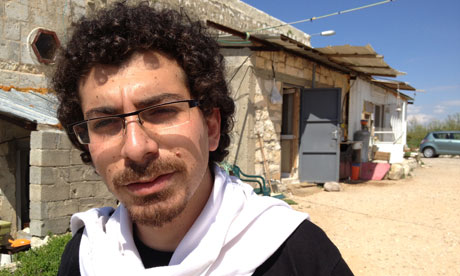Return to Iqrit: how one Palestinian village is being reborn
 Wednesday, May 15, 2013 at 09:12PM
Wednesday, May 15, 2013 at 09:12PM http://www.guardian.co.uk/world/2013/may/15/return-iqrit-palestinian-village-israel
Their parents and grandparents were evicted 65 yeares ago when Israel was created. Now they are going back.
Harriet Sherwood in Iqrit The Guardian 15 May 2013

On a breezy hilltop in sight of the Lebanese border, a village last populated 65 years ago is being reclaimed from the dead for the living. Vegetables and herbs have been planted amid the rubble; a couple of donkeys graze on spring grass; traditional food is cooked and eaten in a makeshift structure next to the Church of Our Lady, where mass is celebrated for up to 200 worshippers on the first Saturday of every month.
This is Iqrit, a Palestinian Christian village in northern Galilee, whose inhabitants left in the bitter war that followed the declaration of the state of Israel in 1948, and who have never been permitted to return to their land and razed homes.
But in recent months, a group of young men, grandsons of Iqrit's original residents, have moved back in an attempt to reclaim and rebuild the village.
And as Palestinians commemorate on Wednesday the Nakba, or catastrophe, of the loss of their land to Israel 65 years ago, work is being completed on a proposal for around 500 homes to be built on the site for the descendants of Iqrit's inhabitants, 90% of whom wish to return to the village. The plan is expected to be published in September.
What is unusual about this demand for the "right of return" is that the villagers and their descendants are Israeli citizens, mostly living in the area, rather than refugees in Palestine and in the diaspora.
In November 1948, six months after the state of Israel was declared, the new Israeli army arrived at Iqrit to tell the villagers they must leave because the area was dangerous. Most of the 490 inhabitants were transferred to a nearby village, taking only basic necessities, in the belief they would be gone for two weeks. But the area was declared a military zone and the villagers were forbidden from returning.

The people of Iqrit took their case to Israel's newly constituted supreme court, which ruled in July 1951 that their evacuation was illegal and they must be permitted to return to the village. But on Christmas Eve of that year, Israeli soldiers demolished the village, leaving only the church and the cemetery intact. Later, the village land was taken for state use.
Since then, the villagers have fought a legal battle that ended 10 years ago with a final supreme court ruling rejecting their demand to be allowed to reclaim their land. The original villagers and their descendants – now around 1,500 people scattered across northern Israel – are allowed only to hold services in the church and bury their dead in the cemetery. "We are refugees in our own country," said Nemi Ashkar of the Iqrit community association.
Last summer, around a dozen young men decided to take matters into their own hands. "At the moment Iqrit people have the right to return only in a coffin, but we want to live here," said Walaa Sbait, 26, a schoolteacher in Haifa, 40 miles away.
The group planted young saplings and built a chicken coop, which Sbait said the Israeli authorities had demolished. "They are making the chickens refugees, too," he said, adding that the two donkeys had also been threatened with eviction.
The group consists of university students, factory and restaurant workers, and teachers. "Of course, it would be more comfortable to sip espresso in a coffee shop in Haifa, but we have a belief in our right to live here," said Sbait.
The Iqrit community association says it has been offered support by Israeli politicians on both the right and left, and from Israeli artists and intellectuals. Father Souhail Khoury, the priest of the church, says he grew up listening to his parents reminisce about their lost land. "We are all in different villages and towns now, but this is the place where we still meet every month as a family," he said. "This is the place we call home."
---------------------------------------------------------
 APJP |
APJP |  Post a Comment |
Post a Comment |
Reader Comments